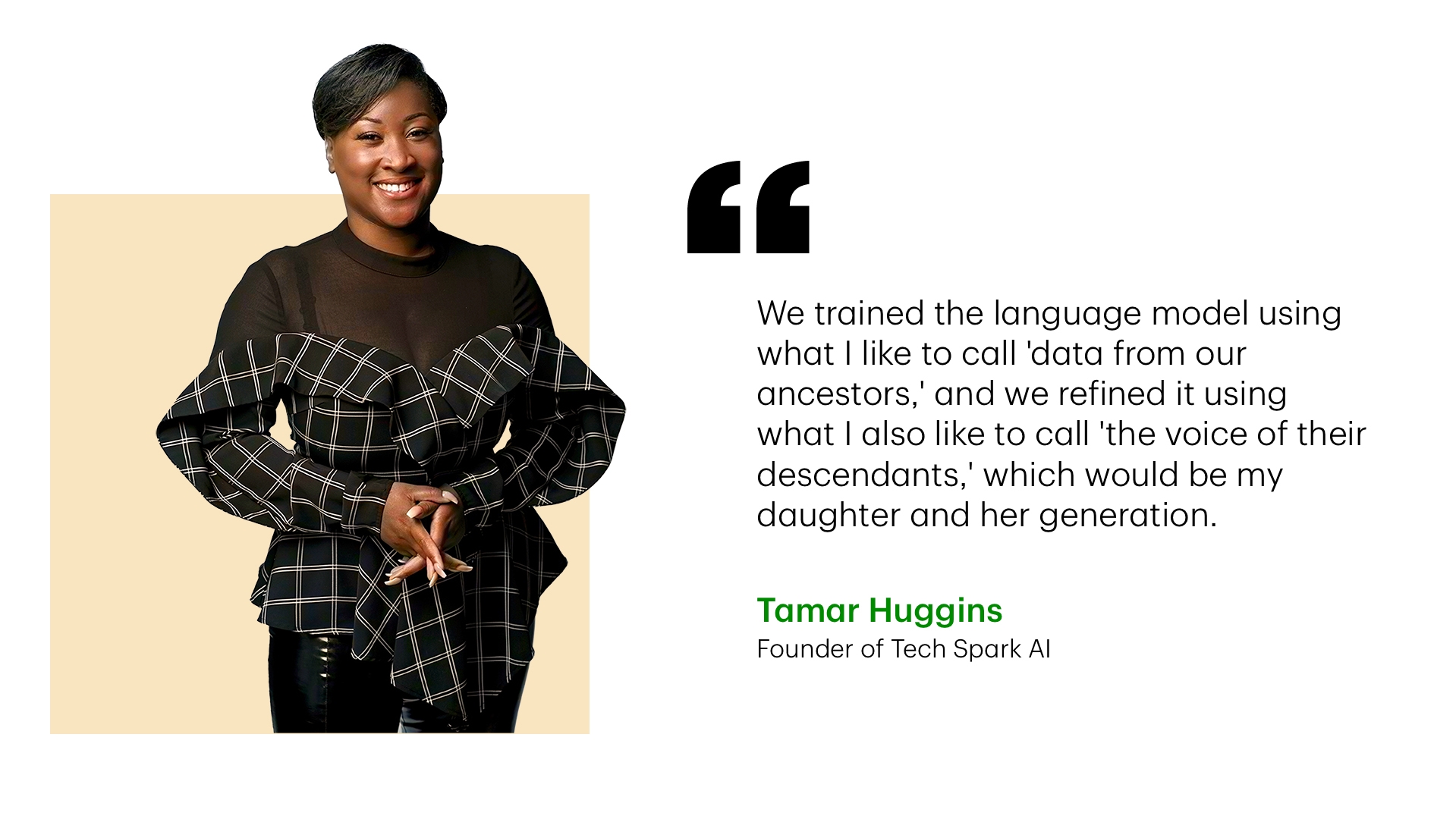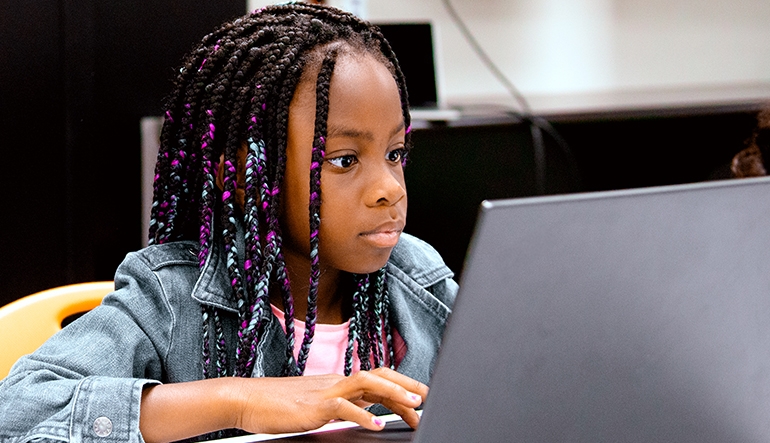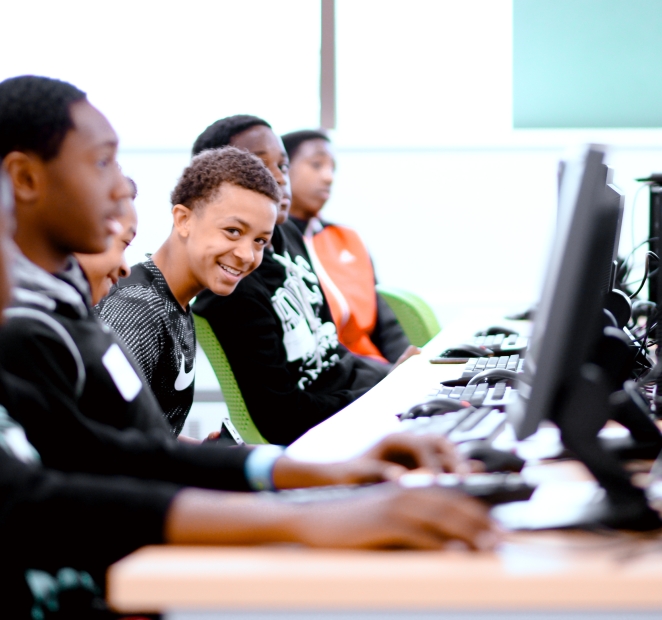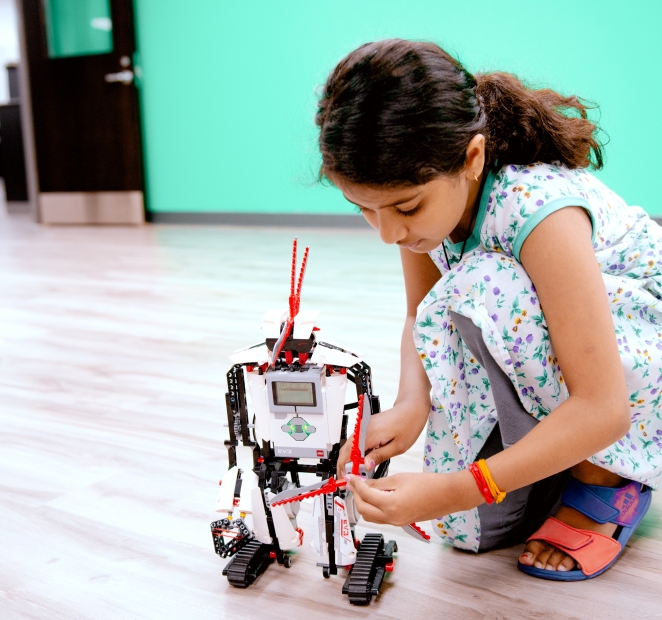T amar Huggins is an award-winning tech entrepreneur and the founder of Tech Spark AI – an educational technology (EdTech) company – and Spark Plug, a generative AI chatbot that transforms classic literature into culturally responsive language that can resonate with a Gen Z audience. In 2021, Tech Spark received a $1 million TD Ready Challenge grant to kickstart Spark Plug. In honour of Black History Month 2024, Huggins reflects on her career and the importance of inclusive education and cultural responsibility in tech.
As told to TD Stories.
My journey back to the classroom wasn't straightforward.
I'm surprised I ended up here, but my current role running an educational technology (or EdTech) company – which combines data, artificial intelligence, and hip-hop culture – is exactly where I belong.
I went from working in creative advertising to launching my own startup focused on creating opportunities for Black entrepreneurs, women entrepreneurs, and entrepreneurs of colour. Eventually, I pivoted to the education space and founded the non-profit Tech Spark, where my team and I work to support Black and equity-deserving students in the classroom and beyond.
Now, our biggest project is Spark Plug, a new chatbot powered by generative artificial intelligence (AI) designed to transform classic literature into culturally responsive language that can resonate with a Gen Z audience.
We trained our generative AI chatbot using open-source data, including letters and speeches, with a focus on the Civil Rights Movement and the Harlem Renaissance. We trained the language model using what I like to call "data from our ancestors," and we refined it using what I also like to call "the voice of their descendants," which would be my daughter and her generation. The voice of the chatbot, or how Spark Plug answers students, was designed in a meaningful way to be and to reflect the voice and tonality of Black and equity-deserving students.
So how did I launch this EdTech startup, land a $1 million TD Ready Challenge grant to build a new AI platform, while educating thousands of students and teachers in the process?
It all started when I got laid off.
My first startup venture
I studied advertising at Centennial College in Toronto and soon after graduation, I was lucky to find work in my chosen field. However, during the 2008 recession, I lost my job. That experience forced me to recalibrate.
After being laid off, one thing I was certain of was that I didn't want to rely on anyone else for employment ever again; I wanted to be my own boss.

In the late aughts and early 2010s, the big, ubiquitous tech companies that now dominate our home screens were just getting off the ground. Facebook launched in 2005, Twitter (now known as X) followed in 2006 and Instagram entered the market in 2010. Start-up culture was becoming mainstream, and tech seemed like an industry with unlimited possibilities.
Tech accelerators – or programs that help launch new entrepreneurial ventures often in exchange for company equity – were an important part of the startup ecosystem. I noticed that in Toronto specifically, there weren't any accelerators geared towards underrepresented founders in tech – including Black founders, women founders, and founders of colour – and so that was a space I wanted to fill.
In 2012, I created DRIVEN, a tech accelerator specifically geared towards serving these founders. Our mission as a non-profit group was not to take equity from startups, but to provide them with advanced training, mentorship, and access to capital that they were not getting from other accelerators at the time to help them launch and get funding for their businesses.
DRIVEN was a success. We ran it from 2012-2014 and had four different groups of participants, or cohorts, during that time. Out of those cohorts, several startups went on to raise more than $20 million. However, we realized we were a little early in the marketplace. We weren't seeing as many women and Black founders applying to the accelerator as we had hoped. A lot of them had great business ideas that needed incubating, but they weren't necessarily ready for outside investment after participating in our 12-week accelerator.
The need for education
We realized that many of the individuals from equity-deserving communities that we were hoping to target were less likely to pursue careers in STEM (science, technology, engineering and math); they weren't receiving the training or tools needed to inspire or pursue a tech-focused career. My team and I looked at how we could work with investment-ready founders to help fill the pipeline. We decided to focus on training young people and exposing them to the world of tech and entrepreneurship to help ignite—or spark—a passion for technology. The idea for Tech Spark was born and we launched tech-focused programs for students in 2015.
We began hosting bootcamp-type programs for high school students in coding, gaming and user experience, or UX, design. Our goal was to teach students who were typically streamed away from technology courses and promote entrepreneurship among them. We had the opportunity to support a refugee in our first cohort of students who was new to the country.
He was able to build on his skillset with Tech Spark training, create a portfolio and gain entrance into the web development program at Humber College in Toronto. Another was a single mother who worked in the arts, as a film director. She was able to build her own website to promote her work, which has gone on to win multiple awards. Those early wins fueled us.
However, it was hard to retain older students; they could join and leave our programs as they pleased. So, we pivoted towards offering classes for students ages 9-12. A chance encounter with a superintendent in the Durham District School Board (just east of Toronto), led me to present Tech Spark at a board meeting, and eventually, we began to run programs in Durham-area schools.
Around the same time, we created the first tech entrepreneurship course for grade 11 students. It's a course that goes towards their Ontario Secondary School Diploma and it's currently running in several schools across the Greater Toronto Area. That for me is one of our biggest success stories. We've gone from bootcamps and workshops to integrating into the school system and training the educators on how to deliver the courses that we design.
Building on that initial spark
Our next big project was, and continues to be, Spark Plug.
Right now, you can go into the platform, pull a scene from Shakespeare and use a prompt like, "explain this in a way for me to understand it in modern terms or in modern language." And it will respond by giving you the modern translation. What makes Spark Plug unique is its voice. We used my 13-year-old daughter to train the AI model to respond in a way that would resonate with her age group.
And that's exactly who Spark Plug is for: middle and high school students. It was important that we were intentional about who we were designing the product for, and the problem that we were looking to solve, which focuses on engagement issues, learning loss, content retention and rigor in the classroom. We've seen a huge drop in these areas since the pandemic, especially among students who were already struggling. We thought, how can we use technology to help solve this problem in a way that hasn't been done before? In a way that doesn't feel like extra work for teachers?
Spark Plug was the answer and a $1 million TD Ready Challenge grant in 2021 helped us not only build out the platform, but expand our reach and awareness across North America.
Initially, Spark Plug was used to help personalize learning experiences in reading and math for Black and equity-deserving middle school students. But with the ongoing advancements in generative AI, we've been especially focused on expanding Spark Plug as a chatbot with the goal of having it respond to student inquiries in culturally responsive language, no matter where they live.
And students are really excited about it. To have a piece of tech respond to you in the way you speak to your friends was not something that anyone could really fathom until now. As we work to expand Spark Plug's reach through integration into more schools and educational technology platforms across North America, I'm eager to see what the future holds for us as AI continues to become more mainstream.
This may not have been the route I planned for myself, but now, I can't imagine walking down any other path.
To learn more about how TD is supporting Black communities head to td.com/marchforward, and visit the TD Ready Commitment to learn more about how we are working toward helping create a more inclusive and sustainable future.










